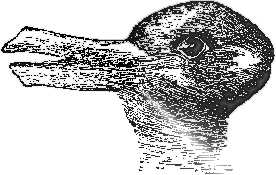| Line 1: | Line 1: | ||
{{menu secção 4}} | {{menu secção 4}} | ||
| + | [[image:rabbduck.gif]] | ||
| Line 8: | Line 9: | ||
| − | A neutral voice starts reading Wittgenstein’s ''Tractatus | + | A neutral voice starts reading Wittgenstein’s ''Tractatus Logico-Philisophicus'' |
| Line 16: | Line 17: | ||
Working on it in an acoustic way is our purpose. | Working on it in an acoustic way is our purpose. | ||
| − | The method consists on recording sentences – starting | + | The method consists on recording and adding sentences – starting with the first one – and adding the second, the third and so for obtaining first a duo, then a trio, then a quartet, and so on. Gradually perception becomes more and more difficult and eventually you lose it. Then starts the reverse process, ending up again with a solo the last sentence. |
As it would be logically philosophical to expect. | As it would be logically philosophical to expect. | ||
Revision as of 16:16, 30 August 2007
Logicus & Filosoficus
A neutral voice starts reading Wittgenstein’s Tractatus Logico-Philisophicus
The Tractatus is a particular kind of book with an particular structure. (As you can see in the Tractatus’s map)
Working on it in an acoustic way is our purpose.
The method consists on recording and adding sentences – starting with the first one – and adding the second, the third and so for obtaining first a duo, then a trio, then a quartet, and so on. Gradually perception becomes more and more difficult and eventually you lose it. Then starts the reverse process, ending up again with a solo the last sentence. As it would be logically philosophical to expect.
Logicus & Filosoficus - dur. 20min.
for voice and Pro-Tools.
Directed by Alvaro García de Zúñiga and Pedro Coelho
with Alínea B. Issilva
for João Almeida /a coproduction with RDP- Antena 2
